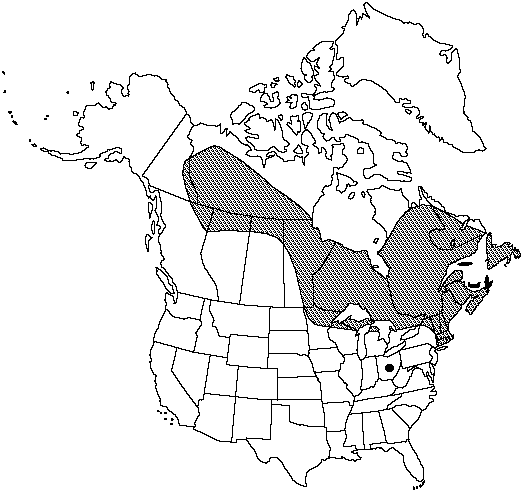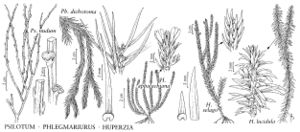Huperzia selago
Hort. Reg. Monac. 3. 1829.
Shoots erect, indeterminate, 8–12 cm, becoming short-decumbent; leaves of mature portion slightly smaller than leaves of juvenile portion (more pronounced in sun form); indistinct annual constrictions present (more pronounced in shade form); juvenile growth erect. Leaves spreading-ascending (shade) to appressed-ascending (sun) in mature portion, more reflexed in juvenile portion, green (shade) to yellow-green (sun), lustrous; largest leaves triangular, widest at base, 4–7.5 mm; smallest leaves lanceolate, 3.5–5 mm; margins almost entire, papillate; stomates on both surfaces, numerous on adaxial surface, 30–90 per 1/2 leaf. Gemmiferous branchlets produced in 1 pseudowhorl at end of annual growth; gemmae 4–5 × 3–4.5 mm, lateral leaves 1.5–2 mm wide, broadly acute. Spores 29–37 µm. 2n = 268.
Habitat: Terrestrial in sandy borrow pits, ditches, lakeshore swales, and conifer swamps, rarely on acidic, igneous rock or calcareous coast cliffs
Elevation: 0–700 m, rarely to 1600 m
Distribution

St. Pierre and Miquelon, Alta., B.C., Man., N.B., Nfld. and Labr. (Nfld.), N.W.T., N.S., Ont., P.E.I., Que., Sask., Yukon, Conn., Maine, Mass., Mich., Minn., N.H., N.Y., Ohio, R.I., Vt., Wis., Europe, Asia.
Discussion
Plants from Greenland formerly identified as Huperzia selago are H. appalachiana.
Selected References
None.
